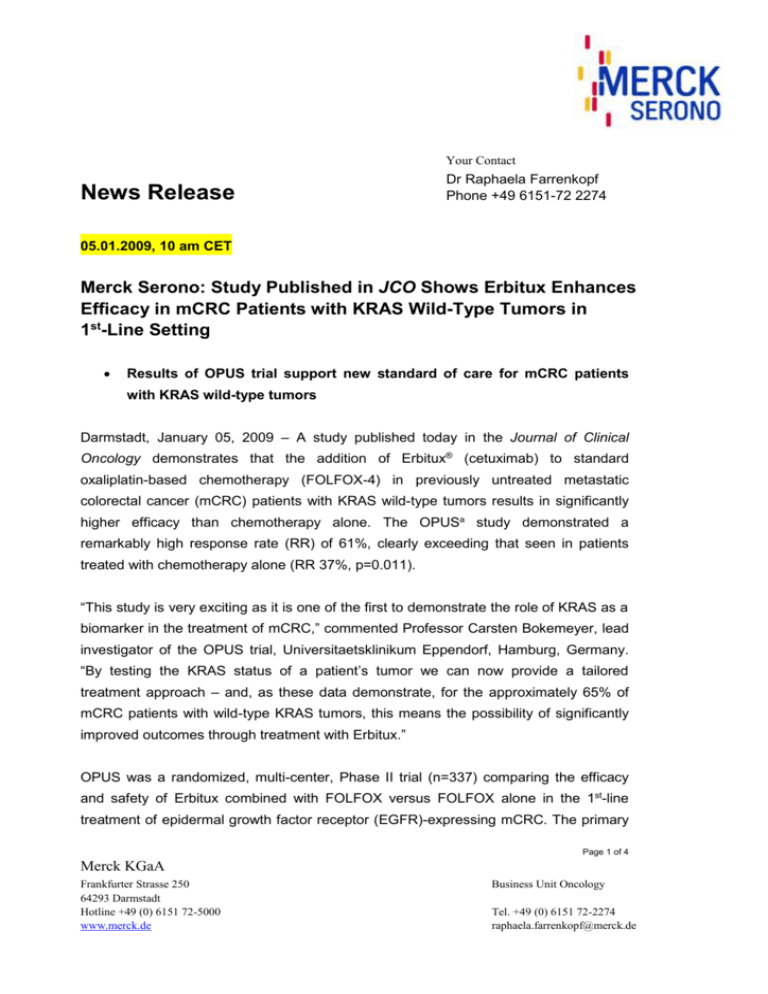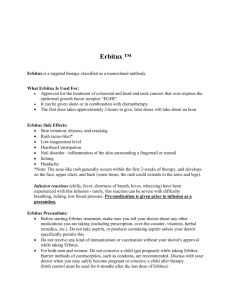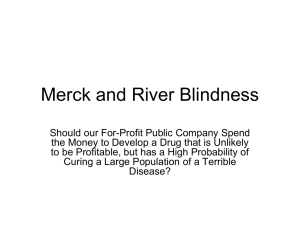Press release - NHS Evidence Search
advertisement

Your Contact News Release Dr Raphaela Farrenkopf Phone +49 6151-72 2274 05.01.2009, 10 am CET Merck Serono: Study Published in JCO Shows Erbitux Enhances Efficacy in mCRC Patients with KRAS Wild-Type Tumors in 1st-Line Setting Results of OPUS trial support new standard of care for mCRC patients with KRAS wild-type tumors Darmstadt, January 05, 2009 – A study published today in the Journal of Clinical Oncology demonstrates that the addition of Erbitux® (cetuximab) to standard oxaliplatin-based chemotherapy (FOLFOX-4) in previously untreated metastatic colorectal cancer (mCRC) patients with KRAS wild-type tumors results in significantly higher efficacy than chemotherapy alone. The OPUSa study demonstrated a remarkably high response rate (RR) of 61%, clearly exceeding that seen in patients treated with chemotherapy alone (RR 37%, p=0.011). “This study is very exciting as it is one of the first to demonstrate the role of KRAS as a biomarker in the treatment of mCRC,” commented Professor Carsten Bokemeyer, lead investigator of the OPUS trial, Universitaetsklinikum Eppendorf, Hamburg, Germany. “By testing the KRAS status of a patient’s tumor we can now provide a tailored treatment approach – and, as these data demonstrate, for the approximately 65% of mCRC patients with wild-type KRAS tumors, this means the possibility of significantly improved outcomes through treatment with Erbitux.” OPUS was a randomized, multi-center, Phase II trial (n=337) comparing the efficacy and safety of Erbitux combined with FOLFOX versus FOLFOX alone in the 1st-line treatment of epidermal growth factor receptor (EGFR)-expressing mCRC. The primary Page 1 of 4 Merck KGaA Frankfurter Strasse 250 64293 Darmstadt Hotline +49 (0) 6151 72-5000 www.merck.de Business Unit Oncology Tel. +49 (0) 6151 72-2274 raphaela.farrenkopf@merck.de News Release objective was response rate. In the intention to treat (ITT) population, 46% of patients receiving Erbitux in combination with FOLFOX experienced a response, compared to 36% of patients treated with chemotherapy alone (p=0.064). In a retrospective efficacy analysis (n=233) it was shown that 61% of patients with KRAS wild-type tumors responded when treated with Erbitux plus chemotherapy, compared to 37% of patients in the chemotherapy alone arm (p=0.011). In addition, the risk of disease progression in the Erbitux plus chemotherapy arm decreased by 43% (hazard ratio 0.57, p=0.0163) and the complete (R0) resection rate more than doubled (9.8% vs. 4.1%) compared with those in the chemotherapy alone arm. Due to small patient numbers these resection data should be interpreted with caution, however, in the metastatic disease setting, complete resection provides the only hope for cure for patients. Safety and tolerability were also studied in the OPUS trial, and the Erbitux plus FOLFOX combination was found to be generally well-tolerated with no evidence to suggest that Erbitux increased the frequency or severity of the known toxicities of oxaliplatin-based chemotherapy. Moreover, the incidence and severity of skin reactions, infusion-related reactions and mucositis were consistent with the known safety profile of Erbitux. “The publication of these important data represents another step towards the new era for mCRC treatment,” said Dr Frank T. Weber, Senior Vice President and Head of Medical Science and Innovation, Merck Serono. “The enhanced efficacy that Erbitux provides patients with KRAS wild-type tumors in the 1st-line – as demonstrated by the high response rates in the OPUS study – clearly supports the role of Erbitux as a new standard of care for these patients.” Alongside the Phase III CRYSTALb trial, results from the OPUS trial formed the basis for the recently granted license extension of Erbitux in Europe to include the 1st-line treatment of patients with EGFR-expressing, KRAS wild-type mCRC. More than 370,000 people develop colorectal cancer in Europe every year, accounting for 13% of the total cancer burden and around 200,000 deaths.1 Approximately 25% of Page 2 of 4 News Release patients present with metastatic disease.2 Five-year survival rates for patients with mCRC are as low as 5%.3 Approximately 65% of mCRC patients have KRAS wild-type tumors.4 a b OPUS: OxaliPlatin and cetUximab in firSt-line treatment of mCRC CRYSTAL: Cetuximab combined with iRinotecan in first line therapY for metaSTatic colorectAL cancer References 1. 2. 3. 4. Parkin DM, et al. CA Cancer J Clin 2005;55:72–108. Cunningham D and Findley M. Eur J Cancer 1993;29A(15):2077–2079. Macdonald JS. CA Cancer J Clin 1999;49(4):202–219. Van Cutsem E, et al. ESMO 2008; Abstract No: 710. For more information on Erbitux in colorectal, head & neck and non-small cell lung cancer, please visit: www.globalcancernews.com. About Erbitux Erbitux® is a first-in-class and highly active IgG1 monoclonal antibody targeting the epidermal growth factor receptor (EGFR). As a monoclonal antibody, the mode of action of Erbitux is distinct from standard nonselective chemotherapy treatments in that it specifically targets and binds to the EGFR. This binding inhibits the activation of the receptor and the subsequent signal-transduction pathway, which results in reducing both the invasion of normal tissues by tumor cells and the spread of tumors to new sites. It is also believed to inhibit the ability of tumor cells to repair the damage caused by chemotherapy and radiotherapy and to inhibit the formation of new blood vessels inside tumors, which appears to lead to an overall suppression of tumor growth. The most commonly reported side effect with Erbitux is an acne-like skin rash that seems to be correlated with a good response to therapy. In approximately 5% of patients, hypersensitivity reactions may occur during treatment with Erbitux; about half of these reactions are severe. Erbitux has already obtained market authorization in 76 countries. It has been approved for the treatment of colorectal cancer in 75 countries so far: Argentina, Australia, Belarus, Canada, Chile, China, Colombia, Costa Rica, Croatia, Dominican Republic, Ecuador, El Salvador, Guatemala, Honduras, Hong Kong, Iceland, India, Indonesia, Israel, Japan, Kazakhstan, Kuwait, Lebanon, Liechtenstein, Malaysia, Mexico, Moldova, New Zealand, Nicaragua, Norway, Oman, Pakistan, Panama, Peru, the Philippines, Qatar, Russia, Serbia, Singapore, South Africa, South Korea, Switzerland, Taiwan, Thailand, Ukraine, Uruguay, the US, and Venezuela for use in combination with irinotecan in patients with EGFR-expressing mCRC who have failed prior irinotecan therapy. In the European Union, the license was updated in July 2008 for the treatment of patients with epidermal growth factor receptor (EGFR) expressing, KRAS wild-type mCRC (metastatic colorectal cancer) in combination with chemotherapy and as a single agent in patients who have failed oxaliplatin- and irinotecan-based therapy and who are intolerant to irinotecan. Apart from the European Union label, Erbitux is also approved for single-agent use in: Argentina, Australia, Canada, Chile, Colombia, Costa Rica, Dominican Republic, Ecuador, El Salvador, Guatemala, Honduras, Hong Kong, Iceland, Japan, Lebanon, Liechtenstein, Mexico, Moldova, New Zealand, Nicaragua, Norway, Panama, Peru, the Philippines, Russia, Singapore, Thailand, the US, and Venezuela. Page 3 of 4 News Release In addition, Erbitux in combination with radiotherapy has been approved for the treatment of locally advanced squamous cell carcinoma of the head and neck (SCCHN) in 70 countries: Argentina, Australia, Belarus, Brazil, Canada, Chile, Colombia, Costa Rica, Croatia, El Salvador, the European Union, Guatemala, Hong Kong, Iceland, India, Indonesia, Israel, Kazakhstan, Kuwait, Lebanon, Liechtenstein, Malaysia, Mexico, Moldova, New Zealand, Nicaragua, Norway, Oman, Pakistan, Panama, Peru, the Philippines, Qatar, Russia, Serbia, Singapore, South Africa, South Korea, Switzerland, Taiwan, Ukraine, Uruguay, the US, and Venezuela. In Argentina, Chile, Costa Rica, El Salvador, Guatemala, Hong Kong, Israel, Lebanon, Mexico, Moldova, Nicaragua, Peru, the Philippines, Russia, and the US, Erbitux is also approved as monotherapy in patients with recurrent and/or metastatic SCCHN who failed prior chemotherapy. In the European Union, the license was updated in November 2008 for the 1st-line use in combination with platinum-based chemotherapy in patients with recurrent and/or metastatic squamous cell carcinoma of the head and neck. Merck licensed the right to market Erbitux outside the US and Canada from ImClone Systems, a whollyowned subsidiary of Eli Lilly and Company, in 1998. In Japan, ImClone Systems, Bristol-Myers Squibb Company and Merck jointly develop and commercialize Erbitux. Merck has an ongoing commitment to the advancement of oncology treatment and is currently investigating novel therapies in highly targeted areas, such as the use of Erbitux in colorectal cancer, squamous cell carcinoma of the head and neck and nonsmall cell lung cancer. Merck has also acquired the rights for the cancer treatment UFT ® (tegafur-uracil) – an oral chemotherapy administered with folinic acid (FA) for the first-line treatment of metastatic colorectal cancer. Merck is also investigating among other cancer treatments the use of Stimuvax® (formerly referred to as BLP25 Liposome Vaccine) in the treatment of non-small cell lung cancer. The vaccine was granted fasttrack status in September 2004 by the FDA. Merck obtained the exclusive worldwide licensing rights from Oncothyreon Inc., Bellevue, Washington, USA. About Merck Serono Merck Serono is the division for innovative prescription pharmaceuticals of Merck, a global pharmaceutical and chemical group. Headquartered in Geneva, Switzerland, Merck Serono discovers, develops, manufactures and markets innovative small molecules and biopharmaceuticals to help patients with unmet medical needs. Its North American business operates in the United States and Canada as EMD Serono. Merck Serono has leading brands serving patients with cancer (Erbitux®), multiple sclerosis (Rebif®), infertility (Gonal-f®), endocrine and cardiometabolic disorders (Glucophage®, Concor®, Saizen®, Serostim®), as well as psoriasis (Raptiva®). With an annual R&D investment of around € 1bn, Merck Serono is committed to growing its business in specialist-focused therapeutic areas including neurodegenerative diseases, oncology, fertility and endocrinology, as well as new areas potentially arising out of research and development in autoimmune and inflammatory diseases. For more information, please visit www.merckserono.net or www.merck.de About Merck All Merck Press Releases are distributed by e-mail at the same time they become available on the Merck Website. Please go to http://www.subscribe.merck.de to register online, change your selection or discontinue this service. Merck is a global pharmaceutical and chemical company with total revenues of € 7.1 billion in 2007, a history that began in 1668, and a future shaped by 32,458 employees in 59 countries. Its success is characterized by innovations from entrepreneurial employees. Merck's operating activities come under the umbrella of Merck KGaA, in which the Merck family holds an approximately 70% interest and free shareholders own the remaining approximately 30%. In 1917 the U.S. subsidiary Merck & Co. was expropriated and has been an independent company ever since. Page 4 of 4







